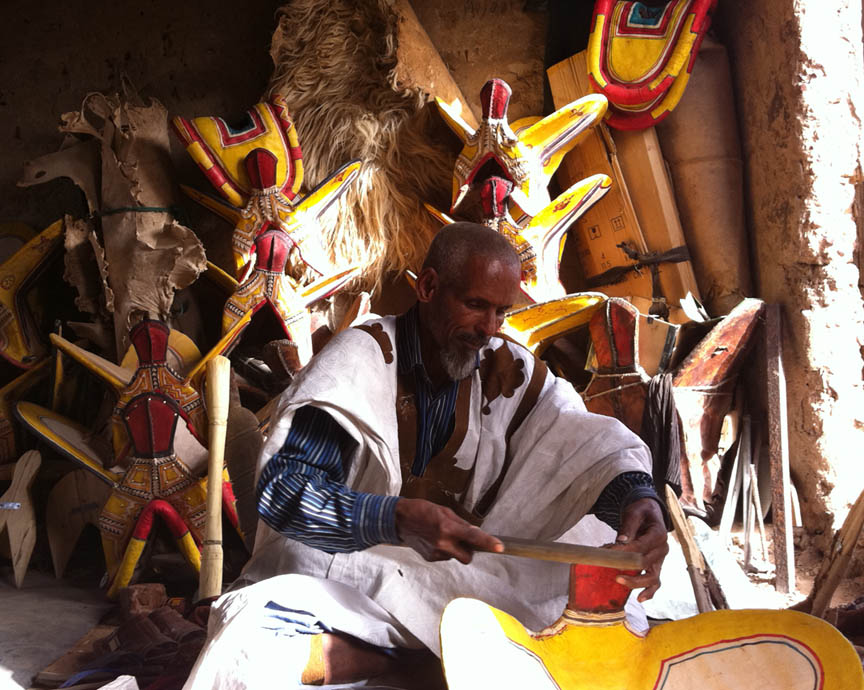

Traditions as tools against poverty and unemployment

By M.A. Boussery
For centuries, Mauritania’s artisans and griots were a central part of their society, the keepers of tradition and know-how, the standard-bearers of values, cultural diversity and national identity.
Artisans made the objects and tools that were essential to the daily lives of their communities. The griots, custodians of Mauritania’s oral traditions and indispensable figures in all ceremonies and rituals, roamed the country with their musical instruments, regaling audiences with poems and songs and passing down their artistry from father to son.
Yet industrialization and the tides of modern musical tastes have taken a toll on these traditional artists; many today are jobless and impoverished.
"With all the industrial objects that have flooded the market, craft-making no longer guarantees sufficient income to support a household. Because I didn’t have the means to develop this ancient craft that I love, I almost abandoned it,” says Moctar Ould Bou Legdam, a wood-worker from Assaba, in south-central Mauritania.
Today, Moctar is back in his workshop, carving and lathing, a beneficiary of an MDG-Fund programme to fight poverty by preserving and supporting Mauritania’s cultural heritage.
Working with three government ministries, three UN agencies and several NGO’s, the MDG-Fund’s joint programme identified a range of cultural products and services and provided micro-credit loans to 214 artisans, 127 of them women, to create income-generating activities. The loan repayment rate was so high -- 95% -- that a second line of credit was recently extended.
Eya Mint Sidi Mohamed, a young carpet-weaver from Kiffa, in south-central Mauritania, used her loan to buy materials for her business. She says the programme, which focuses particularly on empowering women, has allowed a significant number of artisans to establish small businesses and provide a decent life for their families.
Preserving artistic heritage
"Our cultural traditions have opened up job opportunities to many unemployed young people who have become shoemakers, weavers, dyers and seamstresses,” she says. “We have thus been able to preserve some traditional trades that were threatened with disappearance because they weren’t generating enough income. My trade, which I am proud of, will allow me to preserve Mauritania’s artistic heritage and at the same time provide me with a good livelihood.”
The joint programme “Heritage, tradition and creativity for sustainable development in Mauritania” is part of the MDG-Fund’s work to help governments around the world achieve the Millennium Development Goals of reducing poverty, increasing gender equality and improving life for the world’s poorest citizens.
One of four joint programmes operating in Mauritania, it focuses on strengthening the national capacity to develop and promote cultural businesses, as well as the management, conservation and enhancement of the country's cultural heritage.
Among other initiatives, the programme also organized cultural festivals to highlight Mauritania’s musical heritage. These garnered large television audiences and attracted the attention of private investors who have re-ignited demand for griots and Meddahas, traditional bards and poets.
The festivals have become annual events and have spawned new musical and artistic competitions such as “The Golden Voice” and “El Meddah”, whose winners have collected prizes topping $35,000. The 2011 Festival of Cultural Diversity was such a resounding success that the Ministry of Culture has committed to sustaining it as a national event.
In the country's 13 regions and some departments, local authorities have taken the initiative to self-finance cultural festivals. The second festival of ancient cities was held in the historic city of Ouadane in February 2012.
The joint programme has also extended lines of credit to tour operators and small inn-keepers -- the majority of them women -- to encourage cultural tourism as motor for economic growth.
For artisans like Moctar Ould Bou Legdam, the programme has provided an invaluable way to preserve not only his country’s traditions, but also those of his family.
"With this loan, I can reconcile my life and my dreams by making profitable the family workshop that my younger brother and I abandoned after the death of our father,” he says. “I’m proud to be able to practice something that is both practical and enjoyable.”
“Heritage, tradition and creativity for sustainable development in Mauritania” is a collaboration between the government of Mauritania and UNESCO, UNFPA and UNDP.